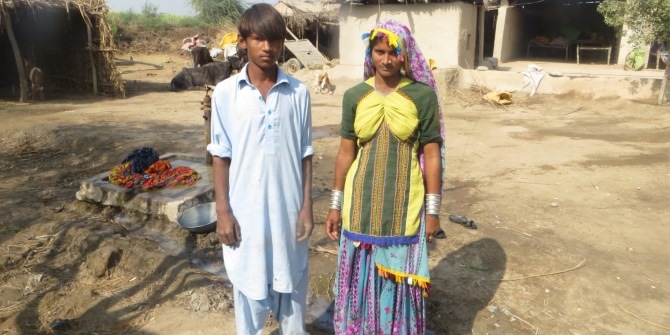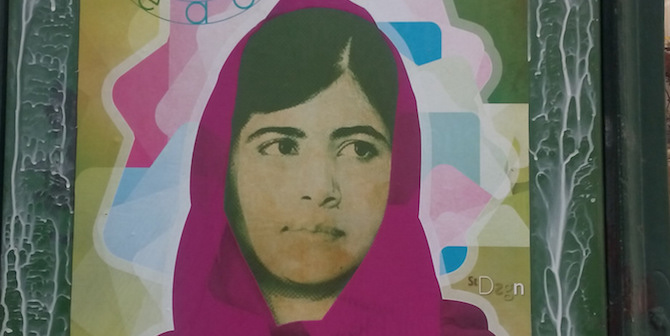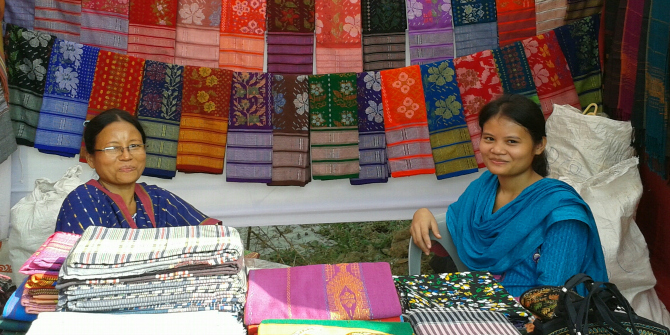
 Pakistan’s Constitution provides for the protection of minorities but in reality discriminatory legislation, social prejudice and sectarian violence leave them vulnerable. In this article, Adam Weinstein and Zahra Dsouza discuss the threat that Deobandi-inspired extremists pose to tolerance in Pakistan, and write that the government cannot turn a blind eye to the treatment of minorities as this will only embolden perpetrators and result in wider and more indiscriminate attacks on society.
Pakistan’s Constitution provides for the protection of minorities but in reality discriminatory legislation, social prejudice and sectarian violence leave them vulnerable. In this article, Adam Weinstein and Zahra Dsouza discuss the threat that Deobandi-inspired extremists pose to tolerance in Pakistan, and write that the government cannot turn a blind eye to the treatment of minorities as this will only embolden perpetrators and result in wider and more indiscriminate attacks on society.
On Sunday Pakistan marked its 69th independence day with cheers of “Pakistan Zindabad” or “long live Pakistan.” But this year has proved to be another year of death for Pakistanis at the hands of Deobandi-inspired terrorists. Deobandi thought is a fundamental interpretation of Islam founded in South Asia that has similarities to Salafism. Some of these attacks have indiscriminately targeted all members of Pakistani society. Yet the minority religious groups of Pakistan including the Shi’a, Christians and Ahmadis have been under siege by extremist Sunni factions for decades.
Such attacks are facilitated by the fact that individuals and minorities in particular tend to live in close proximity to their places of worship. As an illustration, Catholics in Karachi have historically lived in Catholic Colony and Parsis in Parsi Colony. Thus the battle lines are drawn. This is reflected in property values: while residential properties located near the Ismaili Jamat Khana were once very expensive, demand for these properties has fallen as individuals have chosen to live further away for fear of falling victim to attack. Pakistan’s government and overall society adamantly reject indiscriminate attacks against public places and security forces but both have turned a blind eye to the predicament of minority religious groups. However, when Pakistan forsakes its minorities to appease Deobandi sensibilities it foments the very sectarianism that envelops the entire country.
It could be argued that Pakistan today is the most dangerous country in the world to practice the Shi’a interpretation of Islam. Activists within the Shi’a community often claim a slow genocide is occurring within Pakistan and recent events reveal that this statement cannot be dismissed as hyperbole. In 2015 sectarian groups attacked Shi’a Muslims during the annual Moharram commemorations in Jacobabad in which 22 people were killed, and an explosion in a bazaar in Kurram in December killed more than 20 people. A string of mass shootings targeted the Hazara Sh’ia minority in Quetta, Baluchistan. Many of these attacks were claimed by or attributed to the Lashkar I Jhangvi group. Like other Shi’a communities living in Sunni majority countries the typical rhetoric suggests that they are a fifth column of Iran. It is true that Pakistan’s main Shi’a political party Tehrik-e-Jafaria Pakistan and its leader Syed Sajid Naqvi are adamant supporters of the Supreme Leader of Iran Ayatollah Khamenei but this does not translate to blind discipleship. Furthermore, Iran balances its interests in defending Pakistan’s Shi’a community with maintaining a positive relationship with Islamabad. Lastly, the Shi’a community of Pakistan is divided among Ismailis and Ithna ‘Ashari (Twelver) practitioners and does not have an established practice of emulating ayatollahs or adhering to clerical leadership. Thus the Deobandi accusation that Pakistan’s Shi’a community are agents of Iran ignores history.

Smaller religious minorities fair no better. The Ahmadi community identifies as Muslim but are prohibited from asserting themselves as such by law and the fact they cannot vote. Hindus are vulnerable to kidnapping and forced conversions, and continue to migrate to India where they are housed in refugee camps. Hindu and Christian women in particular are subject to forced conversions and marriage in defiance of true Islamic law. Bombings targeting Christians were a regular occurrence since 2013 and on 27 March this year a blast killed at least 75 people in a Lahore park frequented by Christians.
The Constitution of the Islamic Republic of Pakistan provides for freedom of religion and the protection of minorities. However, these guarantees have been thwarted by discriminatory legislation, social prejudice and sectarian violence and as a result tolerance in Pakistan remains a mirage. The government not only permits but engages in violations against minorities that go unpunished. With respect to education, Pakistani textbooks teach intolerance and distrust of minorities by characterising them as non-Pakistani i.e. associating Christians with Britain or identifying them as Western, and Hindus with India. Despite positive rulings by the Supreme Court the government failed to provide adequate protection to targeted groups or to prosecute perpetrators and those calling for violence. In June 2014 the Supreme Court ordered that the federal government establish a special police force to protect religious minorities and revise biased school curricula but the government has failed to protect individuals undertaking these activities. A National Action Plan was implemented to combat extremist attitudes and terrorism although even with these efforts attacks on minority communities and hate speech intended to incite violence continue unabated.
Discriminatory legislation, particularly blasphemy laws, exacerbate religious extremism and vigilantism. Under Sections 295 and 298 of Pakistan’s Penal Code, acts and speech that insult a religion or religious beliefs or defile the Qur’an, the Prophet Muhammad, a place of worship, or religious symbols are criminalised. Violations are interpreted from a Deobani framework exclusive of religious pluralism even for other Muslims. So under these codes a Shi’a could be accused of blasphemy against the Prophet simply for espousing Shi’a interpretations of the Imamate or Prophet’s wives/family. In one case a man named Ghulam Ali Asghar was jailed simply for misquoting a Hadith in Punjabi. Regardless of the standards, allegations of blasphemy are rarely legitimate and are often the product of personal vendettas such as business rivalries. Individuals accused of blasphemy either go into hiding, are taken into protective custody or suffer a brutal death and the cases rarely go to trial. Mob mentality prevails in instances of blasphemy allegations and individuals take the law into their own hands. For example, Naimat Ahmar was a Christian teacher in Faisalabad who was stabbed by his student for alleged blasphemy at the urging of Ahmar’s colleagues.
Where blasphemy cases do come before a court lengthy jail sentences and heavy fines are imposed even when the individuals are acquitted. Yet when vigilantes execute violent extrajudicial punishments against those accused of blasphemy such criminals intimidate judges and threaten witnesses. Entire communities come under attack in response to such allegations. High-profile blasphemy cases and mob violence have affected the Christian community among others: in March 2013, a crowd burned down a Christian area in Lahore after a resident was accused of blasphemy. Institutions associated with these individuals distance themselves from them out of fear of facing reprisals. The issue has become so heated that even Muslims, private and public figures alike who support persons accused of blasphemy have been murdered for taking this stance. In 2011, Salman Taseer, the governor of Punjab province and owner of multiple news outlets was gunned down by his own bodyguard, Mumtaz Qadri, who explicitly said he shot Taseer because of his opposition to Pakistan’s blasphemy law. Qadri was executed earlier this year, but has become a martyr and symbol of the Deobandi movement.
The government of Pakistan and society as a whole must decide whether it will follow Muhammad Ali Jinnah’s vision of a constitutional Islamic republic or sink into the chaos of a Deobandi State. So long as terrorism is justified as heroic or decried solely based on the identity of the victims the latter version of Pakistan will prevail. This choice must not be confused with adopting counter-terrorism strategies of foreign powers that some politicians such as Imran Khan warn against. The necessity of taking a pragmatic approach to transnational terrorist networks like the Taliban is a reality somewhat unique to Pakistan.
But when minorities are killed with impunity the extremists are only emboldened to attack the society as a whole. After all the majority of Pakistan is Sunni Muslim but very few people within that majority measure up to the Deobandi critique of what a Muslim ought to be. Therefore the bombing of a Shi’a mosque or Christian church in Sindh is on the same spectrum of extremism as an attack against a military school in Peshawar. Such incidents cannot be categorised differently because both stem from the same extremist outlook. When Pakistan reaches its 70th year of independence will it remain a country in which minorities claim asylum in droves, educated young people leave en masse, and the political elite maintain two passports because even the leadership has no faith in “Pakistan Zindabad”? Until Pakistan views an attack on any member of society as an attack on the nation itself the answer to that question will remain yes.
Note: This article gives the views of the author, and not the position of the South Asia @ LSE blog, nor of the London School of Economics. Please read our comments policy before posting.
About the Authors
 Adam Weinstein is a third year law student and J.D. candidate at the Temple Beasley School of Law in Philadelphia, Pennsylvania where he focuses on developmental and international law. His interests include the relationship of US foreign policy to development and security within the Middle East and South Asia. He tweets at @AdamNoahWho and can be reached at adam.weinstein@temple.edu.You can view his previous South Asia @ LSE blogs here and his contributions to the LSE Middle East Centre blog here.
Adam Weinstein is a third year law student and J.D. candidate at the Temple Beasley School of Law in Philadelphia, Pennsylvania where he focuses on developmental and international law. His interests include the relationship of US foreign policy to development and security within the Middle East and South Asia. He tweets at @AdamNoahWho and can be reached at adam.weinstein@temple.edu.You can view his previous South Asia @ LSE blogs here and his contributions to the LSE Middle East Centre blog here.
 Zahra Dsouza is a graduate from the Temple Beasley School of Law LL.M. program in Philadelphia, Pennsylvania. She previously worked at a private law firm in Pakistan with a focus on information technology law and served as an international legal and policy consultant to the Council of Europe and Pakistan on matters of cybercrime and electronic transactions. She grew up in Karachi and is a member of the city’s Catholic minority. She can be reached at zahra.dsouza@hotmail.com.
Zahra Dsouza is a graduate from the Temple Beasley School of Law LL.M. program in Philadelphia, Pennsylvania. She previously worked at a private law firm in Pakistan with a focus on information technology law and served as an international legal and policy consultant to the Council of Europe and Pakistan on matters of cybercrime and electronic transactions. She grew up in Karachi and is a member of the city’s Catholic minority. She can be reached at zahra.dsouza@hotmail.com.







